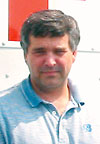Waller worked to reach remote flood victims
By Becky Barclay
Published in News on October 11, 2004 1:57 PM
Seeing destroyed houses and knowing there had been a loss of life -- that was the hardest part of helping the victims of the flooding in western North Carolina, says Chuck Waller.
Waller, 44, director of the Wayne County Chapter of the American Red Cross, volunteered to do public affairs work in Asheville for a week last month. He said the chapter had gotten a call from National Red Cross about the flooding, mudslides and tornadoes that had hit the mountains. The organization was asking for help.

Waller
Waller answered the call. He worked in the Red Cross headquarters in Asheville, which served 10 of the 29 western North Carolina counties that were affected by the storms.
"My job was to help get information out to the community to let the people know that help was available and where to get that help," he said.
"In that situation, there was a lot of real rural communities. There were people on the ends of very winding roads. Some of them still didn't have power. A lot of them had newspapers that run only once a week so didn't get a lot of information that way."
Waller went on TV and radio. But in some of the more remote areas, he had to draw up fliers to send out on the emergency response vehicles that went into the most remote areas.
"We did interviews with mental heath volunteers to let people know the things they could look for," said Waller. "A lot of these people went through a hundred-year flood not once, but twice."
Asheville had a problem with its water system and residents were without water for more than a week. Waller said the Red Cross, in about 2 1/2 week's time, distributed 210,000 gallons of water to people.
At this point, about 40,000 volunteer hours had been put in by the Red Cross.
There were Red Cross volunteers from just about every state and country helping the storm victims in the mountains, said Waller. "There was a tremendous outpouring of help."
Waller went into some of the isolated communities to see the damage and talk to some of the victims.
He talked to a lady who had a friend who knew somebody involved in the big mudslide in Peek's Creek. "She was telling me that the family was in the house and actually felt their house move," he said. "They got out just in time before their house was destroyed."
Peek's Creek was one of the communities Waller visited. "I went to the base of where that mudslide was," he said. "I could see a big pile of mud and trees and then I looked and saw building materials sticking up out of the mud. Then I realized that this thing did take 15 houses with it and there was loss of life.
"That was the hardest part for me. It makes you realize just how fragile life can be."
Waller also went to Canton, which is on the Pigeon River. "It is a very tight-knit community," he said. "They got flooded twice in two weeks.
"I saw a lot of the same things there that I saw here with Hurricane Floyd. I saw the water marks up on the buildings. I saw lots of debris up in trees and hanging from power lines. There was debris piled everywhere."
Waller said the residents were working to get their lives back to some state of normalcy.
"But they are a very resilient people," he said. "A lot of them are economically challenged during the best of times. And this disaster made it a little harder. But most of them said 'so and so' had it worse than they did and helped the others."
Waller said the people were very appreciative that someone searched them out to give them cleanup kits and tell them help was available.
"It was a good experience for me," he said. "I probably gained more from it than I contributed."
Just knowing that he's helping others helps Waller deal with the stress of the situation. "I'm part of an organization whose volunteers are giving back and are there out of the goodness of their heart," he said.
Waller's first experience with Red Cross dates back to 1984 when a tornado ripped through Mount Olive. His mother was on the Red Cross board and she asked him to help set up a shelter.
"Seeing the hardships that those people had to endure always stuck with me," he said. "I wanted to help. I was hooked."
